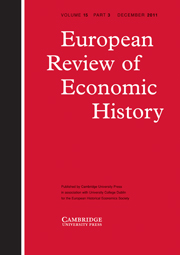Crossref Citations
This article has been cited by the following publications. This list is generated based on data provided by
Crossref.
2004.
Review of periodical literature published in 2002.
The Economic History Review,
Vol. 57,
Issue. 1,
p.
161.
Hatton, Timothy J.
and
Williamson, Jeffrey G.
2006.
Labor Mobility and the World Economy.
p.
1.
Steidl, Annemarie
Stockhammer, Engelbert
and
Zeitlhofer, Hermann
2007.
Relations among Internal, Continental, and Transatlantic Migration in Late Imperial Austria.
Social Science History,
Vol. 31,
Issue. 1,
p.
61.
Hatton, Timothy J.
2010.
THE CLIOMETRICS OF INTERNATIONAL MIGRATION: A SURVEY.
Journal of Economic Surveys,
Vol. 24,
Issue. 5,
p.
941.
Hatton, Timothy J.
2011.
Economics and History.
p.
187.
Abramitzky, Ran
Boustan, Leah Platt
and
Eriksson, Katherine
2012.
Europe's Tired, Poor, Huddled Masses: Self-Selection and Economic Outcomes in the Age of Mass Migration.
American Economic Review,
Vol. 102,
Issue. 5,
p.
1832.
Stolz, Yvonne
and
Baten, Joerg
2012.
Brain drain in the age of mass migration: Does relative inequality explain migrant selectivity?.
Explorations in Economic History,
Vol. 49,
Issue. 2,
p.
205.
Bandiera, Oriana
Rasul, Imran
and
Viarengo, Martina
2013.
The Making of Modern America: Migratory Flows in the Age of Mass Migration.
Journal of Development Economics,
Vol. 102,
Issue. ,
p.
23.
Juif, Dácil
2015.
SKILL SELECTIVITY IN TRANSATLANTIC MIGRATION: THE CASE OF CANARY ISLANDERS IN CUBA.
Revista de Historia Económica / Journal of Iberian and Latin American Economic History,
Vol. 33,
Issue. 2,
p.
189.
Ferrie, Joseph P.
and
Hatton, Timothy J.
2015.
Vol. 1,
Issue. ,
p.
53.
Massey, Catherine G.
2016.
Immigration quotas and immigrant selection.
Explorations in Economic History,
Vol. 60,
Issue. ,
p.
21.
2016.
Roots of Brazilian Relative Economic Backwardness.
p.
265.
Abramitzky, Ran
and
Boustan, Leah
2017.
Immigration in American Economic History.
Journal of Economic Literature,
Vol. 55,
Issue. 4,
p.
1311.
Sequeira, Sandra
Nunn, Nathan
and
Qian, Nancy
2017.
Migrants and the Making of America: The Short- and Long-Run Effects of Immigration During the Age of Mass Migration.
SSRN Electronic Journal ,
Kamphoefner, Walter D.
2017.
Who Went South? The German Ethnic Niche in the Northern and Southern Hemispheres.
Social Science History,
Vol. 41,
Issue. 3,
p.
363.
Cohn, Raymond L.
and
Wegge, Simone A.
2017.
Overseas Passenger Fares and Emigration from Germany in the Mid-Nineteenth Century.
Social Science History,
Vol. 41,
Issue. 3,
p.
393.
Wegge, Simone A.
2017.
Different Profiles, Different Choices: Mid-Nineteenth Century Hessians Who Emigrated to the Southern Hemisphere.
Social Science History,
Vol. 41,
Issue. 3,
p.
415.
Bandiera, Oriana
Mohnen, Myra
Rasul, Imran
and
Viarengo, Martina
2019.
Nation-building Through Compulsory Schooling during the Age of Mass Migration.
The Economic Journal,
Vol. 129,
Issue. 617,
p.
62.
Borjas, George J
Kauppinen, Ilpo
and
Poutvaara, Panu
2019.
Self-selection of Emigrants: Theory and Evidence on Stochastic Dominance in Observable and Unobservable Characteristics.
The Economic Journal,
Vol. 129,
Issue. 617,
p.
143.
Juif, Dácil
and
Quiroga, Gloria
2019.
Do you have to be tall and educated to be a migrant? Evidence from Spanish recruitment records, 1890–1950.
Economics & Human Biology,
Vol. 34,
Issue. ,
p.
115.


